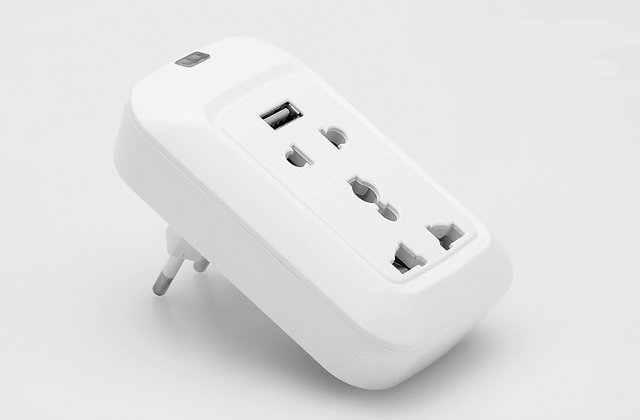I’ve had a look at several Wi-Fi smart sockets recently. Broadlink SP2 comes with a Chinese plug and supports power monitoring (About $40), Kankun KK-SP3 is more basic but sells only for $20, and runs OpenWRT, and Orvibo Wiwo S20 does not support power monitoring either, but is available with US, Europe, United Kingdom or Australia plug (About $40). If you want a Wi-Fi smart socket with a EU plug, there’s another option: W908I selling for $32 on Chinavasion. Based on the manufacturer website (HaiDian Technology) however, there are four W908I models with US, EU, UK, or AU plugs, as well as four W908II models with a higher power ratings (4400W).
 Instead of just one socket like socket models, it features a 3-pin socket, a 2-pin socket, and a USB port for charging devices.
Instead of just one socket like socket models, it features a 3-pin socket, a 2-pin socket, and a USB port for charging devices.
W908I / W908II specifications:
- Wi-Fi
- 802.11 b/g/n
- Sensitivity – 802.11b: < -84dBm; 802.11g: < -68dBm
- Output power – 802.11b: 16 ±2dBm; 802.11g: 13 ±2dBm
- Security – WEP, WPA-PSK or WPA2-PSK
- Wall Socket Power Plug – US, Europe, United Kingdom or Australia plug
- Input Sockets – 3-pin, 2-pin, and USB
- Output Current – W908I: 10A max; W908II: 20A max.
- Output Power – W908I 2200W max; W908II: 4400W max;
- Voltage Range – 90-260V AC @ 50-60 Hz
- Power Consumption – ≤0.8W
- Dimensions – 11.2 cm x 6.4 cm x 7.0 cm
- Temperature Range – -20 C to 75 C
- Weight – 116 grams
The app to control the smart socket is available for Android and iOS, and can be downloaded by scanning the QR code at the back of the socket. Their appears to be a web interface too. Power monitoring function is not available in W908I/II. By the way, Broadlink SP2 does have this function, but it stopped to work on my sample after about a month.
As mentioned above, the W908I-Euro is available on Chinavasion for just $32, but other W908I plug types are available on Aliexpress for prices between $35 and $50, and a few shops sell W908II for about $60.
Thanks to Onebir for the tip.

Jean-Luc started CNX Software in 2010 as a part-time endeavor, before quitting his job as a software engineering manager, and starting to write daily news, and reviews full time later in 2011.
Support CNX Software! Donate via cryptocurrencies, become a Patron on Patreon, or purchase goods on Amazon or Aliexpress




